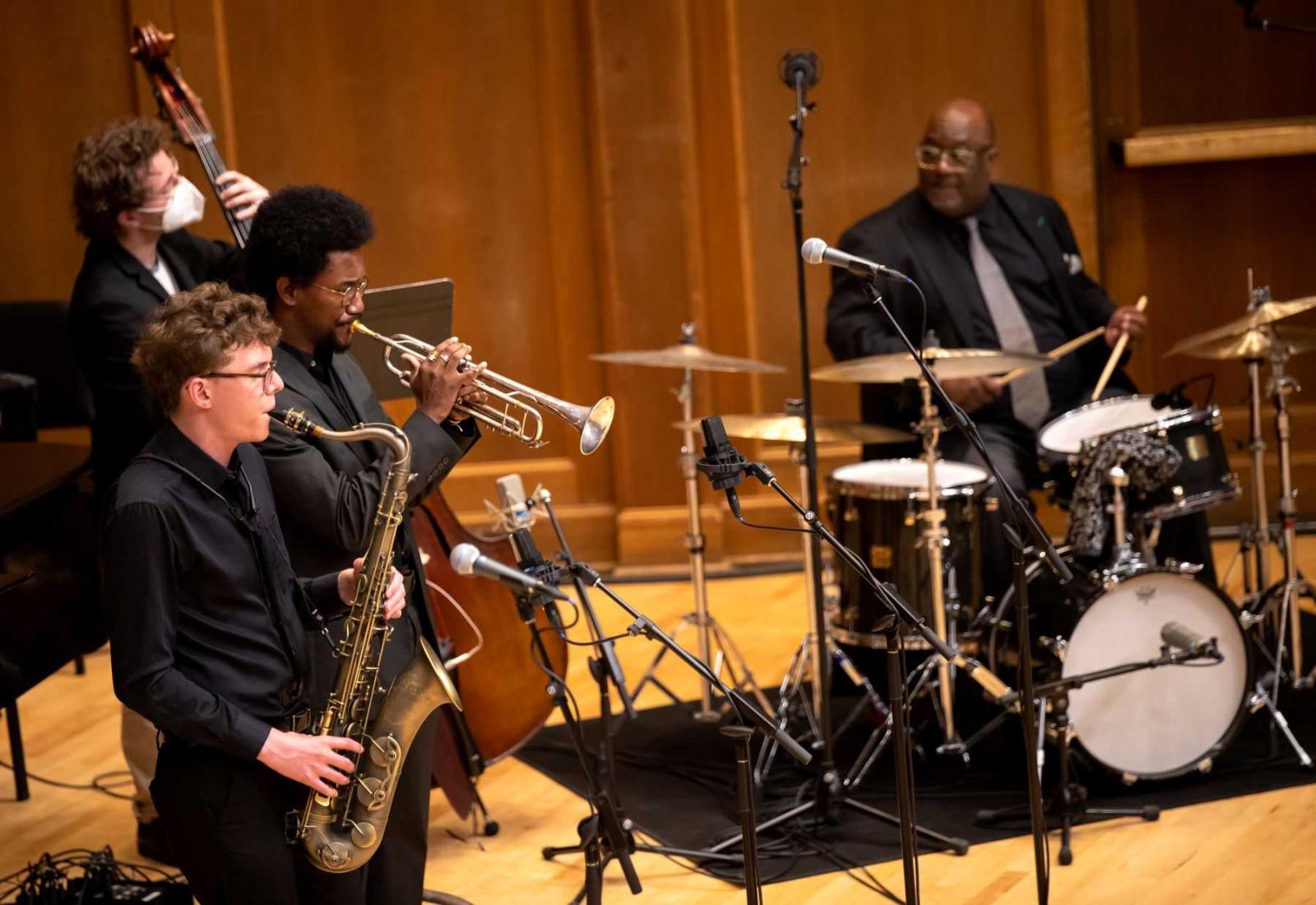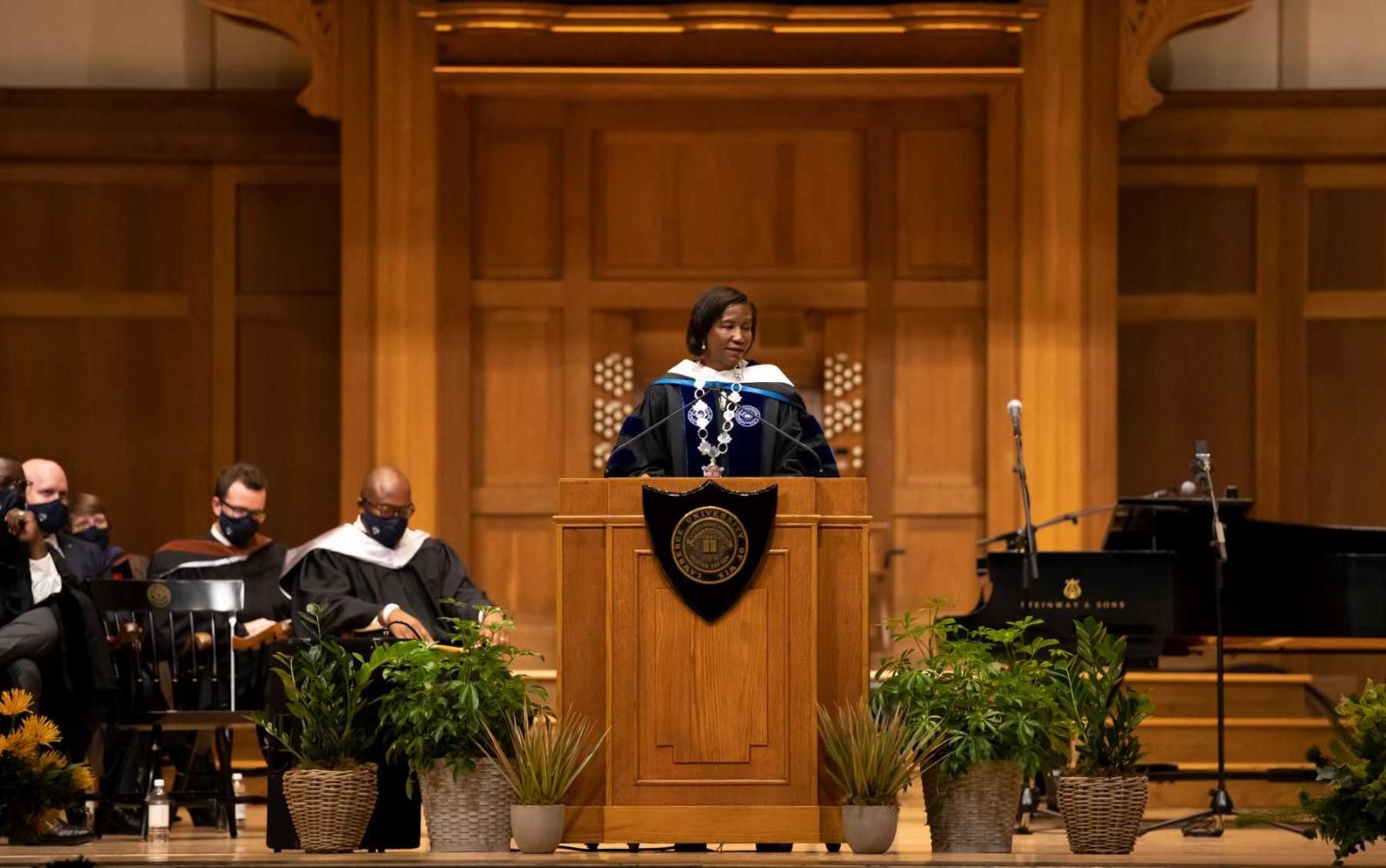President Laurie A. Carter was officially welcomed to Lawrence University Friday with a light-filled inauguration ceremony in Memorial Chapel, marking a major moment in the 175-year history of the liberal arts college.
“For the last 175 years, Lawrence University has sat on the banks of the Fox River, calling students to its light—a beacon on the river,” Carter said in a speech that celebrated her journey, honored Lawrence’s storied history and academic prowess, and set the tone for the hard work ahead in building a strong, bright future. “And this beacon’s light, more light, called to me. The more light I have, the more I can share, and the more lives I can impact. This is why I am so honored to be standing here today.”
Carter, who began her tenure as Lawrence president in July, took note of the history being made as she was inaugurated on a weekend that also includes a celebration of the 175th anniversary of Lawrence’s founding. She is the 17th president to hold office since 1847, the first of color.

President Laurie A. Carter's son, Carter Walker Robinson, places the Chain of Office on her during the inauguration ceremony. (Photo by Danny Damiani)
She was joined at the ceremony by her family, including husband Gary Robinson and son Carter Walker Robinson, and she spoke of lessons imparted by her parents and grandparents as she built a life full of firsts. She was a first-generation college student and would become the first African American to serve as director of residence life at Fairleigh Dickinson University, the first African American vice president at The Juilliard School, and the first woman and first African American to serve as president of Shippensburg University.
“Without realizing it, I embraced the first in first-generation and made it into a career of firsts,” Carter said. “These opportunities have given me the chance to work with young people from across the globe and to mentor and support them as they grow and develop into people who are changing the world.”
Carter’s journey was highlighted in video addresses from Joseph W. Polisi, president emeritus of Juilliard, Daniel Greenstein, chancellor of Pennsylvania’s State System of Higher Education, and Ronald A. Crutcher, president emeritus of the University of Richmond.
Addressing the audience in person was Robert Battle, artistic director of the Alvin Ailey American Dance Theater. He was a dance student at Juilliard in the early 1990s when Carter served on the school’s leadership team. He spoke of the numerous times he sought guidance from Carter and how her wisdom carried with him as he built his career as a dancer, choreographer, and arts leader. He called her a “champion for students who don’t always get it right or know the right answers” and said Lawrence students will now benefit from her mentorship.

Robert Battle talks about how the mentorship of President Laurie A. Carter continues to influence his life and career. (Photo by Danny Damiani)
“I know that so much has been said about your accomplishments and abilities as a leader of excellence,” Battle said. “But this kid right here, who was born bowlegged … this kid from Liberty City who sometimes felt I didn’t belong—this kid that still resides in me wants to thank you for showing me that I belonged, that I could only be limited by my imagination.”
Carter then highlighted Battle’s success as an example of the positive influence mentors can have on the lives of students. It’s a responsibility she takes to heart, one that she wants all Lawrence faculty, staff, and alumni to take to heart in their daily interactions with students.
“Robert, watching you grow from a 17-year-old dancer into the leader of the Alvin Ailey American Dance Theater, one of the world’s preeminent dance companies, has given me incredible joy,” she said. “My career has always focused on students and their success. Having you here tonight is an honor.”
Friday’s tradition-filled ceremony featured delegates from other colleges and universities, including a contingent from Shippensburg, where Carter served as president until joining Lawrence last summer. They joined Lawrence faculty, Appleton Mayor Jake Woodford '13, and other delegates in a procession into Memorial Chapel.
In a showcase of the Conservatory of Music's deep talent, Lawrence students provided music throughout the ceremony, joined by special guest Carl Allen on drums—music that included “rising light,” composed for the inauguration by Evan Williams ’10 and performed by students Kathryn Williams, Taylor DeCastro, Christopher Chang, and Josue Koenig.

Alex Rothstein, Earl Simons, Reese Pike (not pictured), Aaron Brenton, and special guest Carl Allen perform "Blues March" during the inauguration ceremony. (Photo by Danny Damiani)
A brilliant performance of Benny Golson’s “Blues March” was delivered by Earl Simons, Alex Rothstein, Reese Pike, Aaron Brenton, and Allen. And then Carter’s inaugural address was followed by “This Little Light of Mine,” delivered beautifully by Daniel Boyd, Hannah Jones, and Sarah Navy as attendees clapped along while wearing lighted bracelets that lit up the Chapel.
In her speech, Carter praised alumni who have generously supported the university. She thanked her predecessor, Mark Burstein, and applauded faculty and staff who have set the bar high. She thanked the Board of Trustees for approving a strategic investment plan earlier in the day that will allow the university to develop important new programs, strengthen its commitment to faculty and staff, and continue facility upgrades that will help solidify the path forward amid the many challenges facing higher education.
“I came to Lawrence knowing that a liberal arts education is exactly what today’s society demands,” Carter said. “It is what society has always demanded. When I review the resumes of Lawrence’s alumni—top lawyers, leading corporate executives, dedicated teachers, cutting-edge doctors, community organizers, entrepreneurs, and award-winning writers and musicians—I am inspired to ensure that Lawrence deepens its commitment to the liberal arts and secures its place as a national leader in higher education.”
Following the ceremony, attendees gathered for photos and continued the celebration as light spilled from the Main Hall cupola.
As Lawrence marks the 175th year since being granted its charter—a Brighter Together Picnic and related activities are on the docket for Saturday—it’s important to remember that no institution can live solely on past glories, Carter said. Two years in the COVID-19 pandemic and the realities presented by the coming demographic shift of college-aged students have made that abundantly clear to all who are paying attention to higher education.
Lawrence’s history is robust. It includes being one of the first co-educational institutions of higher learning in the country; developing and nurturing both a world-class college of liberal arts and sciences and a world-renowned conservatory of music; and being part of a transformative merger in 1964 with Milwaukee-Downer College. It has shone bright throughout; but challenges keep coming, and Lawrence will need to meet them head on, Carter said.
“The world is rapidly changing,” she said. “We cannot stand still. Like the river that flows through our campus, we must move with the current while honoring the shore around us.”
It’s important, she said, that Lawrentians take those steps together.
“We stand firm in our belief that the education we provide will meet the needs of current and future students,” Carter said.
“Students, you inspire me. You bring so much light to this campus. You have a light within that gives you the potential to become a beacon of your own—the beacon the world needs for a more kind and sustainable future. I encourage you to let your light shine.”




